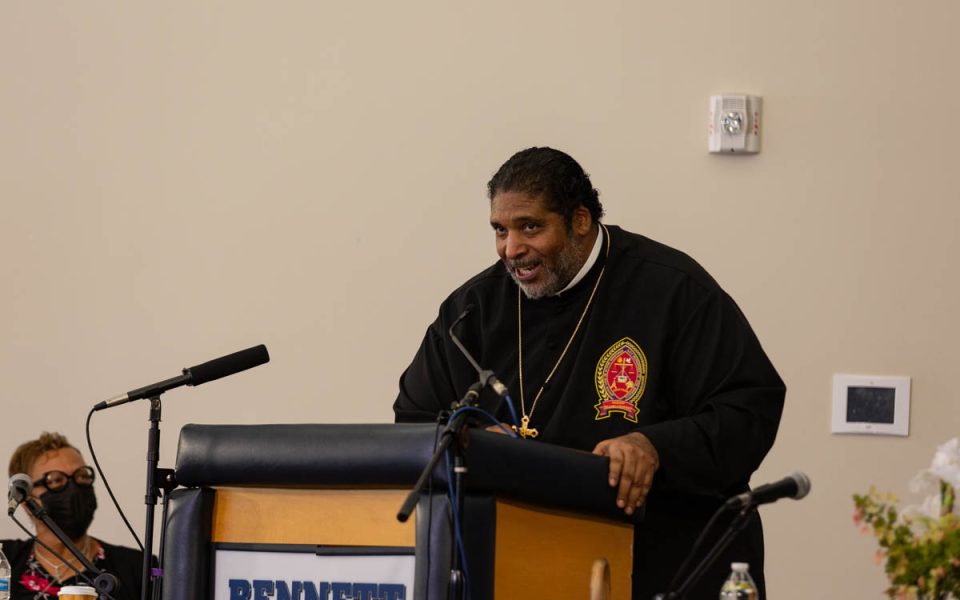Featured photo: Rev. Dr. William J. Barber speaks to attendees of the NC Truth, Justice, and Reconciliation Commission Summit at Bennett College.
This story was originally published by NC Policy Watch on Dec. 20. Story by Joe Killian.
Rev. William Barber, former head of the N.C. NAACP, will lead a new center at the Yale Divinity School.
Barber announced the creation of the Center for Public Theology & Public Policy in a Twitter post Monday, saying it will “prepare a new generation of moral leaders to be active participants in creating a just society.”
Barber plans to step down from his leadership of Greenleaf Christian Church in Goldsboro, which he has led for 30 years, and begin teaching classes at Yale’s campus in New Haven, Connecticut, beginning with the new semester in January.

“I’ve been a pastor & moral activist for 35 yrs,” Barber wrote in a thread of posts. “I want to share what I’ve learned & lead research on the deep connection between theology & just policies.”
“Our work will engage people in critical reflection on our society,” Barber wrote. “Not limited to a partisan analysis, but based on the possibility of a moral grounding of public policy in America. The future of our nation, the well-being of its people, is not about left vs. right or Democrat vs. Republican; it is about right vs. wrong. We need leaders who are rooted in our deepest moral values.”
Barber rose to national fame after leading “Moral Monday” protest marches at the N.C. State Legislative Building in Raleigh beginning in 2013, drawing the ire of conservative state leaders and leading a conviction for trespassing after refusing to leave the building during a 2017 protest at the building. He spoke at the Democratic National Convention in 2016, was awarded a MacArthur “genius” grant in 2018 and delivered the sermon at President Joe Biden’s inaugural prayer service last year. He has served on the NAACP’s National Board of Directors and chaired its Legislative Political Action Committee.
The new center at Yale will focus on teaching, research, social justice advocacy and training young people to do theology-informed social justice work. It will also work with historically black colleges and universities (HBCU) in the South to “build pathways for HBCU students to meaningfully engage in the Center’s work and connect its programs to the history and work of southern freedom movements and institutions.”
Barber’s work with his church, the NAACP and the Poor People’s Campaign – a modern renewal of the Rev. Martin Luther King Jr.’s last social campaign – makes him uniquely suited to lead the new center, said Yale Divinity School Dean Greg Sterling in a statement Monday.
“Dr. Barber’s work and service is in the tradition of public witness that produced Frederick Douglass and Sojourner Truth, Walter Rauschenbusch and Howard Thurman, Ida B. Wells and Dorothy Day, Martin Luther King, Jr., Ella Baker, and Abraham Joshua Heschel,” Sterling said. “Establishment of the Center at YDS is an opportunity to deepen our relationship to a historical movement that revives nearly two centuries of social justice tradition to meet the complex social realities of our time.”
Yale University President Peter Salovey also praised Barber in a Monday statement
“Dr. Barber is a principled leader whose religious convictions and theological insights compel him to serve those who are most vulnerable and to create a more just and equitable world,” Salovey said. “I look forward to working with Dr. Barber, Dean Sterling, and other colleagues at the Divinity School to understand pressing moral challenges and to introduce solutions that will transform society.”
Join the First Amendment Society, a membership that goes directly to funding TCB‘s newsroom.
We believe that reporting can save the world.
The TCB First Amendment Society recognizes the vital role of a free, unfettered press with a bundling of local experiences designed to build community, and unique engagements with our newsroom that will help you understand, and shape, local journalism’s critical role in uplifting the people in our cities.
All revenue goes directly into the newsroom as reporters’ salaries and freelance commissions.


Leave a Reply